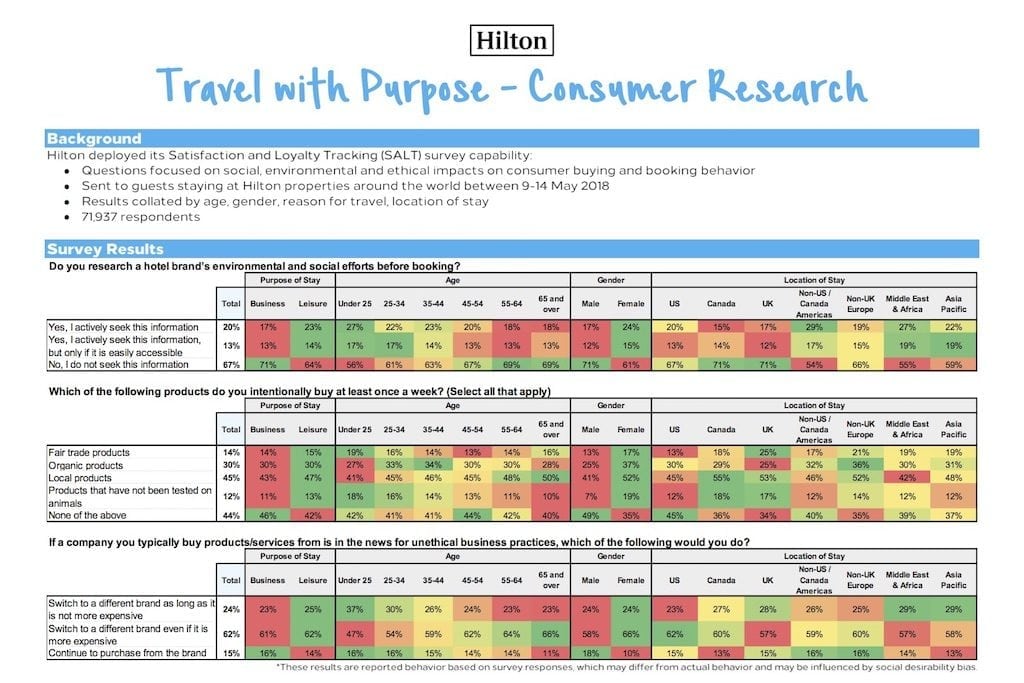Skift Take
Hilton's goals are both lofty and commendable, and it's clear from the data that travelers do care about sustainability and having a positive social impact. But is caring enough to translate into real action? That's the even bigger challenge.
For at least the past two decades, the travel industry has attempted to come up with various ways to encourage travelers to get into the habit of being more eco-friendly.
But, as a recent sustainable tourism roundtable demonstrated, it’s still a major challenge, especially in the hotel space.
New consumer research from Hilton, however, may further the industry’s efforts to promote more sustainable tourism.
Earlier this month, the global hospitality company surveyed 71,937 guests who stayed at Hilton properties around the world to ask them for their thoughts on the impact of social, environmental, and ethical issues on their buying and booking behavior.
The survey found that the majority of respondents (62 percent) would switch to a different brand if a brand they typically bought from was in the news for unethical purposes — even if it were more expensive.
A majority of consumers (56 percent) will also intentionally buy a product that’s fair trade, organic, local, or has not been tested on animals.
While the majority (67 percent) of respondents do not seek out information on a hotel brand’s environmental and social efforts before booking, 20 percent said that they do and 13 percent said they would actively seek out this information, but only if it is easily accessible.
The results didn’t surprise sustainable tourism and development scholars Megan Epler Wood, director of Harvard’s International Sustainable Tourism Initiative, or John Spengler, professor of environmental health at the Harvard T.H. Chan School of Public Health.
“This information is in keeping with other corporate studies,” Epler Wood noted. And while the data is encouraging, she noted that there’s a big difference between intent and action.
“New data … shows that travelers are showing increasing interest in sustainability, especially with the younger generations,” she added. “But interest and action are frequently not easily compared via surveys on consumers.”
And that, in turn, is impacting travel brands, many of which are finding that sustainability is “not in the top five selection criteria for travel to date.”
Even if travelers do care about sustainability, it’s often challenging for them to know how to measure or identify it when they are deciding to book their ravel. She noted, for example, that “aviation is a primary emitter of greenhouse gas emissions” and that the importance of sewage treatment and solid waste management in cities and hotels is crucial for sustainability.
However, as Spengler pointed out, this data from Hilton — along with the company’s new 2030 sustainability goals — does signify “a shift in the conversation about sustainability.”
“It’s not only right to change, but important to change,” Spengler said. “They see a market advantage to that. This is going to make a difference.”
Hilton’s New Goals
In addition to publishing this survey data, Hilton is also committing itself to a stringent corporate responsibility strategy, called Travel With Purpose, that aligns with the United Nations’ Sustainable Development Goals and established carbon emission targets that have been approved by Science Based Targets Initiative.
“The truth is we did this survey to support our underlying beliefs,” Hilton CEO Christopher Nassetta told Skift. “I spend a lot of time with customers of all sorts — leisure and business travelers, group customers — and certainly, every one of those conversations suggests that, increasingly, this is a part of the filtration system that customers have when they decide who they want to stay with.”
Nassetta, who has for many years spoken out about a talent crisis in hospitality, was recently named chairman of the World Travel & Tourism Council in April.
By 2030, Hilton hopes to cut its environmental footprint by half and double its social impact. Some of the ways in which the company hopes to be more sustainable include reducing carbon emissions by 61 percent; reducing water usage by 50 percent; reducing energy usage, the use of plastic straws and water bottles; recycling soap; and sustainably sourcing meat, produce, seafood, and cotton.
Nassetta said that cutting Hilton’s environmental impact by half isn’t just about saving money for the company, but that any money saved will go back into making its hotels even better.
And with regard to social impact, Hilton has plans to double the company’s investment in youth opportunity programs, and will partner with the International Youth Foundation on Passport to Success to attract young talent. The company is also doubling the money it spends with local, small, women, LGBTQ-, and minority-owned suppliers. It will also offer more sustainable event options for groups that hold their gatherings at Hilton properties.
“We are a global business built from 5,300 local businesses,” Nassetta said. “We know the impact we’re already having, and doubling it just means we will have that much more.” He said that working with more minority- and women-owned businesses “worthy for us to be involved in” and that it will yield “tremendously positive return on investment that’s well worth making on everybody’s behalf,” hotel owners included.
Spengler said that Hilton’s commitment to “travel with purpose” is “good for Hilton, but it is also good for people, places and planet.” He added, “Breaking from the shibboleths of conventional hoteliers, Hilton can become the standard barrier for progressive change.”
The Travel Industry Embraces an Evolving Understanding of Sustainability
Hilton’s new goals also reflect the industry’s broader understanding about what it really means to be sustainable, especially in an industry that, by some standards, has been slow to respond. Or in Spengler’s view, an industry that all too often equated “managing efficiencies with being sustainable.”
“Travel is an industry that’s the connective tissue — it’s what connects the world,” Susan McPherson, founder and CEO of McPherson Strategies, a corporate responsibility and social impact consultancy, said. McPherson said that, increasingly, the “private sector is now becoming the moral authority,” and in travel, a change is emerging.
“To me, the travel sector has been lacking in making big audacious goals front and center, equivalent to those of Unilver and other huge corporations. We haven’t seen them from big travel players, so I’m thrilled to see Hilton make a big statement about this and to back up that statement with a bunch of data.”
Hilton isn’t alone in exploring sustainability initiatives. Many other hospitality companies, including Marriott, Hyatt, AccorHotels, and IHG, have also implemented programs to be more sustainable, as well as to attract more young talent and offer more employment opportunities to locals who live in the communities where they have hotels.
And even prior to its new objectives, Hilton was taking steps to be more sustainable by reducing its carbon emissions and waste by 30 percent, and its water consumption by 20 percent since 2008, saving more than a $1 billion in the process.
But there are inherent challenges that many brands have yet to overcome, and the hotel industry is no different.
“The hotel industry is structured in such a way that makes it difficult to achieve what is required to achieve sustainability,” Epler Wood noted. She said it’s especially difficult for brands working with franchisees because “Franchising often leaves owners and hotel management companies without full responsibility for meeting sustainability requirements.”
Still, Hilton’s goals and its research point to “the beginning of a transformation in the hospitality industry,” said Spengler, and hopefully to the larger travel industry.
“Recognizing that hot polluted cities, flooded coastlines, outbreaks of mosquito-borne diseases, depleted ecosystems, and a poor, sick underclass of people is not good for business in the 21st century, Hilton and others now must be ‘leaders with purpose,'” Spengler said.
Have a confidential tip for Skift? Get in touch
Tags: climate change, hilton, social impact, sustainability
Photo credit: As part of its commitment to doubling its social impact, Hilton said it would increase its work with local, minority- and woman-owned suppliers on a global basis. Hilton

